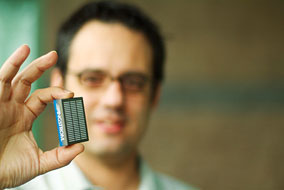
Jorge Marques displays a hydrogen fuel cell - photo by Darin Dueck UBC Reports | Vol. 52 | No. 4 | Apr. 6, 2006
UBC a Test Site on Hydrogen Highway
$10-million proposal would see hydrogen run campus vehicles, cell phones
By Hilary Thomson
It can power a massive submarine or a 10-speed bike light, and the power source can be derived from pig manure.
This versatile device is a hydrogen fuel cell, powered by the most abundant element on earth and key to technologies that UBC plans to demonstrate as part of the BC Hydrogen Highway™ project.
The university is an integral part of the BC Hydrogen Highway™, a co-ordinated, large- scale demonstration program, created to accelerate the commercialization of hydrogen and fuel cell technologies. The National Research Council’s (NRC) Institute for Fuel Cell Innovation at UBC Vancouver’s south campus is also a member.
Announced by the Federal Government in 2004, the program’s network of test sites, or highway, includes Victoria, Surrey, North Vancouver, and Vancouver Airport to Whistler, with full implementation in time for the 2010 Winter Olympics. A consortium of organizations have come together to design, build, test and evaluate hydrogen fuel cell applications that include transportation, stationary, portable and micropower uses of the technology.
UBC’s Campus Sustainability Office (CSO) has proposed a $10-million suite of projects -- approved in principal by Industry Canada -- to test and showcase the efficiency of hydrogen fuel cells.
“Our role in the project is to integrate fuel cell technology into our plans for a sustainable campus,” says Jorge Marques, CSO energy manager. “We want to explore community-oriented applications for hydrogen technology.”
Hydrogen fuel cells are electrochemical devices that generate electricity without combustion by combining hydrogen and oxygen to produce water and heat. Their primary advantage is that, unlike internal combustion engines, they create little air pollution, greenhouse gases, noise, or vibration, and operate at high efficiencies over a wide range of loads. In addition, hydrogen can be produced anywhere in the world.
“We want the UBC community to experience concepts they may have only read about or seen on TV,” says Irfan Rehmanji, project co-ordinator for the UBC node. “The node will integrate a number of concepts that affect our daily life and will be a phenomenal outreach and social marketing tool.”
The university plans to participate with Vancouver’s Westport Innovation to convert a heavy-duty vehicle to a diesel-hydrogen hybrid engine. Another initiative involves a new patrol vehicle for Campus Security that uses a hybrid fuel cell drive train, designed by Lower Mainland companies Dynasty Motors and Delta-Q technologies. The fuel cell will be supplied by Vancouver-based Ballard Power Systems.
Micro fuel cells, supplied by Vancouver-based partner Angstrom Power, will be used to power lights for bikes or bike helmets, to explore how the cells can be used for small-scale applications. Some UBC walkie-talkies and 10-20 cell phones will also be retrofitted with hydrogen fuel cell units.
In addition, UBC will work with TransLink, the Greater Vancouver Transportation Authority, to run a fuel cell-operated 36-passenger community shuttle bus on the Vancouver campus area.
There are three major fuel cell demonstration projects in Canada, says Alison Grigg, manager of the BC Hydrogen Highway™ Project. In addition to the highway, there is the Vancouver Fuel Cell Vehicle project and Hydrogen Village in Toronto.
“B.C. is leading the way in hydrogen fuel cell technology, with delegates from around the world coming to look at what we’re doing,” says Grigg. “UBC is a logical development and demonstration site because of its vision for a sustainable campus and its leadership in sustainability practices and research.”
Hydrogen does not exist by itself in nature -- it must be produced and compressed to be useful. It can be extracted from substances such as natural gas or other fossil fuels, or from methane gas produced at landfills or hog farms. Hydrogen can also be produced using solar or other renewable electricity, such as that derived from water that is electrolyzed from having an electric current run through it.
The NRC Institute for Fuel Cell Innovation on campus currently operates a hydrogen fuelling station, which will be used for the UBC demonstration projects. Creating and storing hydrogen economically is one of the challenges of the hydrogen economy, and has led environmentalist David Suzuki to query if the hydrogen economy is hope or just hype.
He wrote in Science Matters in May 2004 that “to be pollution-free, hydrogen must be made using renewable energy, such as solar or wind. Otherwise, we will simply shift the pollution source from our vehicle tailpipes to smokestacks at hydrogen-production plants.”
Sources of hydrogen are being uncovered all the time, says Grigg, who is confident that sufficient and sustainable supplies can ultimately be made available.
Final funding approval for UBC’s projects is expected this month.
The Hydrogen Highway™ is supported by several Government of Canada organizations that include Natural Resources Canada, Industry Canada, Hydrogen Early Adopters Program, Sustainable Development Technology Canada and Fuel Cells Canada, a private, not-for-profit industry association based at UBC.
For more information on fuel cells, visit www.fuelcellscanada.ca. |
